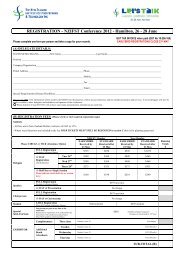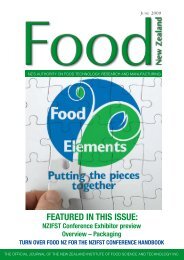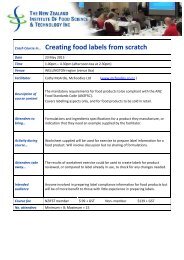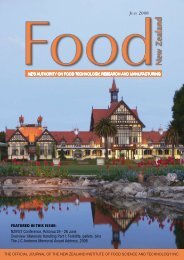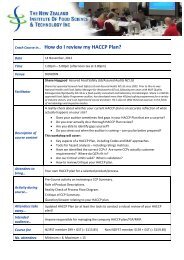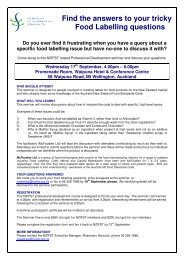F-FILESF-Files – Supporting the next generation<strong>of</strong> food technologistsMuch <strong>of</strong> our reporting in the F-Files aims to provide an introduction to our areas <strong>of</strong> research interest, and to some <strong>of</strong> the keystaff involved.Research within the IFNHH covers a range <strong>of</strong> disciplines: engineering,processing and modelling, food (bio)chemistry, food materialscience and structure, sensory science, microbiology, and <strong>of</strong> coursethe nutritional sciences. Because <strong>of</strong> the complex nature <strong>of</strong> foodproduction, manufacture and consumption, research activities areincreasingly reliant on taking a multidisciplinary approach, and thishas been highlighted in our recent articles focused on food structure,perception and digestion.That food production requires such a diverse set <strong>of</strong> scientific disciplinesis recognised also in our teaching. <strong>The</strong> Massey University food technologyundergraduate degree programme – the BFoodTech(Hons)– is a four year one. For the first three years, students are required todevelop pr<strong>of</strong>iciency in all <strong>of</strong> the disciplines listed above – which constitutea remarkably broad range <strong>of</strong> subjects to encompass in a singledegree course. This provides the underlying food science knowledgenecessary for a career in the food industry. However, it is understoodthat these skills need to be applied in an industry context to be reallyrelevant and effective. In this respect, the BFoodTech(Hons) teachesnot only the requisite disciplines integral to food science, but alsoinstils an awareness and an understanding <strong>of</strong> how to apply them ina diverse range <strong>of</strong> food industry settings. This is especially true oncethe students enter the fourth year <strong>of</strong> study. Here, they undertake aprogramme <strong>of</strong> individual and group-based product and process developmentprojects that provide them with the necessary skills andcompetencies for extending their fundamental food science trainingand become highly pr<strong>of</strong>icient food technologists.acterisation, quality assurance, scale up, incremental product redesign,and new product development. This not only draws on all theskills garnered over the first three years <strong>of</strong> teaching, but also fosterspractical skills, such as self-organisation and timekeeping, projectmanagement, communication and reporting. Often the industrypartner will take an active role in the direction <strong>of</strong> the student. Forstudents, realisation that their efforts may be reflected on the supermarketshelves can be a hugely motivating factor, and, <strong>of</strong> course, developingindustry contacts early on is no bad thing with the end <strong>of</strong> thecourse appearing on the horizon. <strong>The</strong> final year project is carried outby students not only at Massey University’s campuses at PalmerstonNorth and Albany, but also at our Singapore campus.Diverse project topicsThis year’s projects have covered a remarkably diverse set <strong>of</strong> foodsystems:Industry relevance in final yearprojects<strong>The</strong> key to this approach is to ensure that the activities in the students’final year have a high degree <strong>of</strong> industry relevance, particularly in thecase <strong>of</strong> their individual product development projects. <strong>The</strong>se projectsspan both semesters in the fourth year, a total <strong>of</strong> 24 weeks. At thestart, students are given a project brief outlining the main objectives<strong>of</strong> the work. <strong>The</strong>y are then required to scope out the project, carryingout a literature review <strong>of</strong> the topic area and, as part <strong>of</strong> developing anappreciation <strong>of</strong> intellectual property, conducting a freedom to operatesearch. <strong>The</strong>y are then required to construct and implement a projectplan as part <strong>of</strong> meeting their objectives, this usually culminatingin food production at pilot plant scale. <strong>The</strong>ir progress is monitoredby academic supervisors, and appraised through project reporting atregular intervals.<strong>The</strong> scope <strong>of</strong> project activities extends from relatively fundamentalfood research projects through to close-to-market new product development.This allows the students some choice based on their preferencesand aptitudes. However, in all cases, the projects must havea clear market application in mind. Many <strong>of</strong> the fourth year studentprojects are in fact sponsored by food industry partners, allowingeach student to work in the context <strong>of</strong> a real-life industry scenario asdefined by their industry sponsor.Such projects might focus on aspects <strong>of</strong> food safety, nutritional char-Sam Neumegen investigated mechanisms by whichfoams could be intensely colouredSam Neumegen undertook a research-focused project investigatingmechanisms by which foams could be intensely coloured. Hisapproach was to reverse-engineer an existing piece <strong>of</strong> (non-food)prior art using food-grade materials in a way that was consistent withhis hypothesis for foam coloration. In addition to designing appropriateformulations and developing protocols for foam generation,he needed to develop new techniques for characterising changes infoam colour over time. While not specifically commercially driven,the project generated a number <strong>of</strong> novel scientific findings, with potentialmarket application in product areas such as beverages. Sam’sproject was sponsored by the Riddet <strong>Institute</strong>.10Food <strong>New</strong> <strong>Zealand</strong>
F-FILESCloser to market, the task <strong>of</strong> producing amodel Thai frozen meal <strong>of</strong> high quality wasgiven to Ngan Dinh. Possible causes forloss <strong>of</strong> quality due to freezing and thawingwere identified early on and strategies for processingto mitigate these losses were generated.Of particular importance to the thawedand heated product quality was the rate <strong>of</strong>freezing. Ngan conducted freezing experimentsand identified a model that was able topredict the time <strong>of</strong> freezing. <strong>The</strong> model wasthen used to identify variables that greatly affectedthat rate. Using the model, the freezingprocess was optimised and then validated.Recommendations concerning pre-freezingproduct formulations and processing weremade on the basis <strong>of</strong> experimental results.Ngan Dinhdeveloped afrozen Thaimeal <strong>of</strong> highqualityProcessing equipment <strong>of</strong> an appropriate scale for commercial productionby the sponsor was identified, and costs estimated. <strong>The</strong> projectwas sponsored by Chada Thai, in Palmerston North.Gemma Wynne-Lewis had the task <strong>of</strong> developing an entirelynew range <strong>of</strong> baked snack bars for another industry sponsor. A classicproduct development process was followed. After an analysis,with the help <strong>of</strong> a focus group, <strong>of</strong> the strengths and weaknesses <strong>of</strong>bars currently on the market, a consumer survey was used to identifythe important purchasing drivers for baked bars. <strong>The</strong> data obtainedenabled the generation <strong>of</strong> new product concepts, which werethen developed further with the help <strong>of</strong> another focus group. <strong>The</strong>most popular concepts were then identified by means <strong>of</strong> a secondconsumer survey. Two <strong>of</strong> these concepts were then formulated intoGemma Wynne-Lewis’ final year project was thedevelopment <strong>of</strong> a new range <strong>of</strong> baked snack barsprototypes. Sensory testing was used to improve the prototypes anddevelop a range <strong>of</strong> flavours. Achieving a bar water activity that waslow enough to ensure a long shelf life while ensuring a product thatwas perceived as being not overly dry was a challenge successfullymet. <strong>The</strong> project delivered a range <strong>of</strong> flavoured bars that were wellliked by consumers, as well as being formulated in a way that alloweda number <strong>of</strong> positive nutrition claims to be made, and thatcould be produced at below target costing.Want to know more?<strong>The</strong>se projects represent a small cross-section <strong>of</strong> the kinds <strong>of</strong> projectsundertaken by our students. As part <strong>of</strong> student development,we strongly encourage the <strong>New</strong> <strong>Zealand</strong> food industry to provide thecreative ideas for these projects, as it really does provide studentswith an early appreciation <strong>of</strong> life in the industry, and ultimately providesyou with better future employees. Certainly, for small to mediumsized industry partners, a fourth year project also representsan extremely cost effective approach for research and development,although <strong>of</strong> course it should be noted that these projects, being essentiallylearning exercises, are not guaranteed to end in successfulproduct launches! So, if you are interested in sponsoring a fourth yearproject, please contact Michael Parker who co-ordinates the foodtechnology projects paper. [m.e.parker@massey.ac.nz]December 2011/January 2012 11



